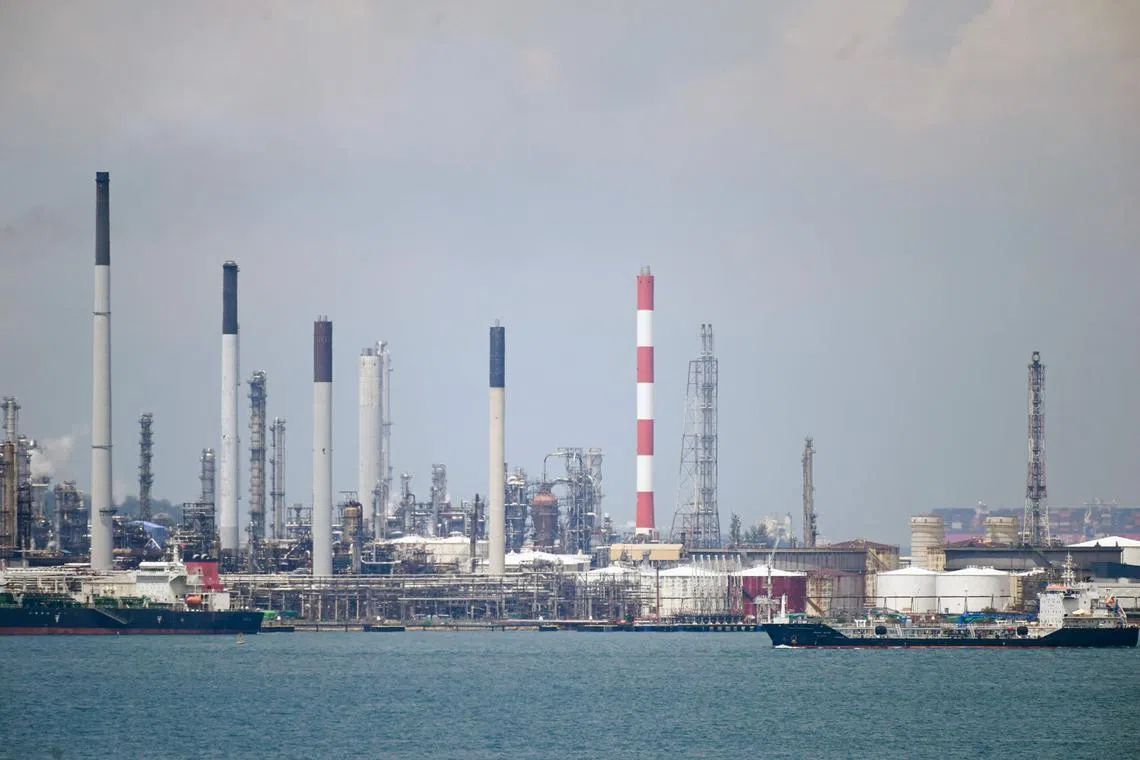Some companies in S’pore to get allowances to adjust to carbon tax hikes
Sign up now: Get ST's newsletters delivered to your inbox

From 2024, Singapore’s carbon tax will rise to $25 per tonne of greenhouse gas emissions from the current $5.
PHOTO: AFP
Follow topic:
SINGAPORE - As Singapore imposes higher carbon tax rates from 2024 to rein in its greenhouse gas emissions, it will also try to ensure that its firms remain competitive.
It will do this by giving allowances to the larger emitters of greenhouse gases in the oil and gas, chemicals, manufacturing and semiconductor sectors. This will help them adjust to the higher carbon tax, rates but does not mean they will get a free pass with their emissions, Parliament was told on Tuesday.
These companies are part of the emissions-intensive trade-exposed (EITE) sectors that face intense competition in the global market and higher costs, said Minister for Sustainability and the Environment Grace Fu.
“(The allowances) will be limited to only a portion of companies’ emissions, help to alleviate near-term competitiveness concerns, and provide a form of support to the companies as they work on reducing emissions and invest in cleaner technologies,” she added.
She was speaking at the debate on the Carbon Pricing (Amendment) Bill, which saw more than 10 MPs speak.
From 2024, Singapore’s carbon tax will rise to $25 per tonne of greenhouse gas emissions from $5.
Currently, facilities that emit at least 25,000 tonnes of greenhouse gases per year are subject to a carbon tax, and they include 30 to 40 large emitters such as oil refineries and power generation plants. They contribute 80 per cent of the nation’s greenhouse gas emissions.
“We have decided to raise the carbon tax level progressively in phases and with advance notice, to give our businesses time to plan and carry out their low-carbon transition,” said Ms Fu.
The Ministry of Sustainability and the Environment had received some public feedback that giving allowances to EITE sectors goes against the “polluter-pays” principle of a carbon tax. MPs also asked on Tuesday if such tax allowances erode the price signals for these firms.
Ms Fu said the tax allowances reduce the risk of companies shifting their operations and emissions to countries with less stringent climate policies.
Minister of State for Trade and Industry Low Yen Ling added that the EITE companies have collectively contributed about $21 billion in value, employed about 29,000 people here and supported local small and medium-sized enterprises (SMEs) as suppliers.
But she emphasised that the allowances will not give these firms a free pass to persist with emissions. The amount of allowances given to each facility will depend on its decarbonisation plans and how energy efficient it is.
Workers’ Party MP Leon Perera (Aljunied GRC) proposed that the facilities to receive allowance be revealed for transparency.
Ms Low said the Government may consider releasing aggregated information on the allowances, while safeguarding commercially sensitive information.
Many MPs agreed that the trickle-down effect of raising carbon tax on households and SMEs should be cushioned. The $25 per tonne tax from 2024 will lead to about a $4 increase in monthly utility bills for an average four-room Housing Board flat.
“We have been and will continue to support the households with U-Save rebates,” said Ms Fu.
SMEs can tap available grants and schemes to help make their operations more energy efficient. Companies can also use carbon credits to offset up to 5 per cent of their taxable emissions. To that end, a new international carbon credits (ICC) framework will be set up, she said.
International carbon credits are tradable certificates that represent the reduction or removal of emissions that will be achieved through projects outside Singapore. Such projects include reforestation or forest conservation overseas.
“Under the ICC framework, companies will have the option to tap eligible ICC to fulfil part of their carbon tax liability,” said Ms Fu.
A major problem with ICC is that some of them can be of poor quality – meaning the overseas projects may not have a positive impact on the climate.
Ms Fu said the ICC framework will ensure that carbon credits used by tax-liable companies are of high environmental integrity and compliant with existing international standards. To help firms, a list of acceptable international carbon credits will be published, highlighting the eligible projects’ host countries, carbon crediting programmes and methods.
Later this week, the National Environment Agency will call a tender for an International Carbon Credits Registry. The registry will track and account for the usage of the carbon credits by tax-liable companies.
Ms Poh Li San (Sembawang GRC) and Nominated MP Janet Ang said the 5 per cent cap on using carbon credits might be too low to support a vibrant carbon trading market in Singapore, and technologies are limited in achieving large emission reductions.
In response, Ms Fu said: “What we will do is start at 5 per cent – at a limit that we think we can manage – and then as the (carbon) market develops... we will make changes along the way.”

